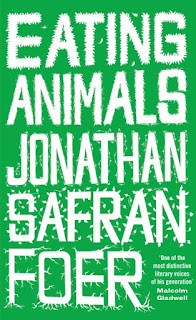The verdict:
While Foer is undoubtedly a talented writer, I feel that his fictional titles are far superior to this guilt-driven, blood fest.
The title, as you might have guessed by now, is one man's journey to determine what it is to eat animals from the industry that Americans (and other parts of the world) rely on for food sources. After the birth of his first child, Foer begins to examine where the meat he ingests actually comes from. Naturally we find (because the title wouldn't have amounted to much if the sites he visited were lush pastures with fresh air and open spaces) that the childhood fantasy of a gentle farmer is just that-- a fantasy. The factory farms that Foer infiltrates (and, yes, he does attempt a mission impossible like adventure with an animal activist) are grime ridden, torture chambers. Readers discover that animals have standing room that is roughly the size of a standard sheet of paper, inhabiting large sheds devoid of natural light; add the fact that they're genetically modified so that they grow additional parts on their bodies and are pumped full of antibiotics to prevent illness that occurs anyway. The scenes are horrific-- gut-wrenching-- producing gasp-out-loud moments. And while it's disgusting and forces readers (most likely individuals that already sympathize with the stand against such treatment) to examine their food sources and speak up, Foer's inclusion of such horror comprises over half the book. Ok, Foer, we get it. We understood on page 30.
My problem is this: Foer explicitly states that he's not trying to force individuals into giving up their meat eating habits completely. He goes as far as admitting that a world devoid of meat eaters is completely unrealistic. However, he spends most of the book using the most disgusting examples he can provide to induce shock-- to guilt the reader into choosing an alternative lifestyle. When he actually has the chance to explore farmers/ranchers/herders that are actually ethically raising livestock for human consumption, he makes passing remarks as if to discredit the movement entirely. If a world full of meat eaters is completely unrealistic, then why not provide the readers (who at this point have almost certainly decided that their factory farm meat eating days are over) additional resources as to what they can do to make changes in their own lifestyle?
Furthermore, if Foer had been submitting this paper to a professor in college, there's no way it would have received a passing grade. Sure, he provided statistics, but he rarely provided any information to elucidate these stats, simply throwing them within a paragraph. The text was so disorganized that I had a hard time following along with some of the arguments he was trying to expound upon.
The text wasn't a complete bust, though. I enjoyed his discussion of the interpretation of language and how that plays a part in the foods that Americans typically eat. Why do Americans find eating a pig, an animal similar in behavior to that of a cat, completely normal, while dogs/cats are completely off limits?
The idea that items labeled "fresh" and "free range" are hardly what you probably think they are. It's made me realize that I need to make big changes to my diet. Although J and I aren't big meat eaters, we've started visiting local markets to buy local eggs and other dairy products, in addition to meat. It feels good to support a local effort that's working hard to be sustainable. The numerous causes that the text supported require further research on my part, and I'm really looking forward to what I'll learn and work into my lifestyle. I felt that it really encouraged a great discussion. Furthermore, this title offered Ang a platform to discuss the issues that she felt were important in her own life with a group where this type of sharing should flourish.










